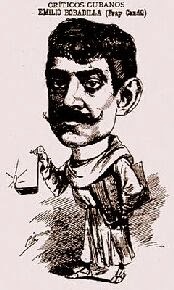Incessant commentator on the literary life, critic, polemicist and even duelist, of Emilio Bobadilla , better known as Fray Candil , much was talked about in Cuba, Spain and other parts of Hispanic America. And there was even a lot of talk about his death, because it happened on January 1st, in 1921, and as the reader will understand, on such a jubilant and New Year's date is not the time to undertake the last trip.
But Bobadilla is today a literary personality who is little known. It is affirmed that his acrimonious style, critical of him, led him in his last years to distill "a certain shade of bitterness, of melancholy", in the words of the late professor and academic Salvador Bueno .
Our character explained one day the reasons for his nickname: «I sign myself Fray, because the friars enjoy a certain immunity to say whatever comes to their habit, and Candil, because I like to make light where the shadows prevail». Prior to this, he had used another pseudonym, Dagoberto Mármara , with which he signed epigrams that appeared in his book Sal y pigmento , whose title gives an idea of the scathing style and spicy content of his articles, sometimes fierce and irreverent, like someone he feels in possession of the whole truth, something that did not earn him much appreciation and quite a few grudges, quarrels and risks. His articles and comments provoked literary controversies, one of them the most notorious, with the Spanish Leopoldo Alas, Clarín, the author of the novel La Regenta , with whom he held a duel in 1892 in which the Hispanic received more than one cut before the combat was interrupted.
Bobadilla was born in Cárdenas on July 24, 1862 and when the independence war of 1968 broke out, his family emigrated, first to Baltimore and later to Veracruz. On his return, he began law studies at the University of Havana, while collaborating in periodicals, directing the occasional satirical weekly, and gaining renown. In 1887 he embarked for Madrid and two years later he graduated with a doctorate in Civil and Canon Law in that city.
The independence struggle of 1895 took him to Europe and in Paris he adhered to the circles of Cuban emigrants; he publishes abundantly, even in non-Spanish-speaking countries, a nationality that some attribute to him, unaware of his Cuban status.
But something happens to him. «In Bobadilla —writes Max Henríquez Ureña— the procedure of judging a book in four words seemed to have been stereotyped, the more taunting, the better. Instead of dimming his ease to make capricious judgments, it grew more intense with the years.
Here is an example: «[Salvador] Rueda and [Aniceto] Valdivia, each in their own way, are two cases of literary atavism, no matter how much they claim to be modernists. Góngora's degenerate grandchildren, not the sonnets and songs, but the bizarre Góngora of Polifemo and Galatea , a fable that, to be all darkness is dedicated to "Count Niebla", turns everything into hyperbolic images, into garish and superfluous ornament ».
What language that of Fray Candil !
Don Manuel Sanguily counteracts it elegantly: «He finds it natural to pride himself on having a language that he proclaims that he does not deserve, to boast of “continuing to speak with the wild frankness of his wild temperament”; but he does not allow them to do with him what he joyfully does with others».
Brilliant Don Manuel !
However, even his literary enemies recognized Bobadilla for the luster of his word and the success of his criteria when pedantry, lightheartedness and self-sufficiency abandoned him, for which he was an authentic writer.
Fray Candil returned to Cuba in 1909 for two years. He was appointed consul in Bayonne and later in Biarritz, where he died. He was a member of the Academy of Cuban History and the National Academy of Arts and Letters , and although he wrote numerous books (essays, novels, stories, journalism, theater), he left others unpublished. That the word he handled with mastery there are no doubts.
«Despite his ardor and violence, his sarcastic and epigrammatic temperament, his whims and whims, Emilio Bobadilla , who made his pseudonym Fray Candil resound throughout our language , left a remarkable work that deserves a prominent place within Hispano-American literatures. These are the words of Dr. Salvador Bueno .


Deje un comentario